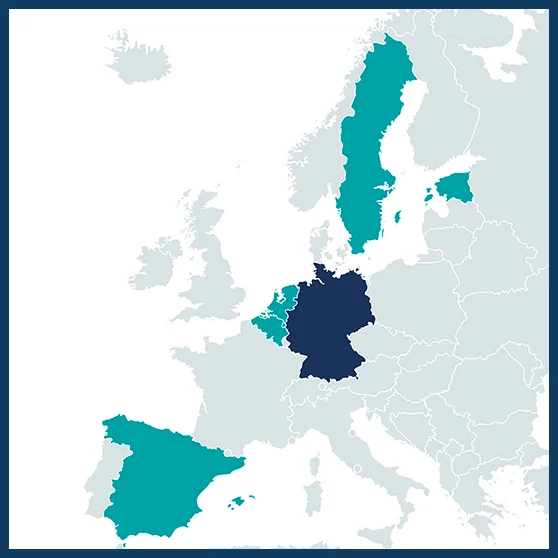01.03.2022 – 28.02.2025
€ 1,183,536
Annika HASS
ahass@gwdg.de
Catrin WESTPHAL
cwestph@gwdg.de
Coordinator: Functional Agrobiodiversity, University of Göttingen, Göttingen, Germany
Ecology, Evolution and Biodiversity Conservation, KU Leuven, Heverlee, Belgium
Ecology & Earth Sciences, University of Tartu, Tartu, Estonia
Plant Ecology & Nature Conservation, Wageningen University & Research, Wageningen, Netherlands
Ecology, Autonomous University of Madrid, Madrid, Spain
Landscape dynamics & biodiversity, Forest Science and Technology Centre of Catalonia, Solsona, Spain
Stockholm Resilience Centre, Stockholm University, Stockholm, Sweden

Calcareous grasslands were created by traditional land use in European cultural landscapes and are one of the most species-rich habitat types. They harbour many rare and highly endangered species but are nowadays often threatened, mainly by abandonment and eutrophication. Hence, restoration measures are urgently needed. However, transnational restoration approaches are missing and evaluations within regional restoration schemes focus usually only on indicator species or species richness and ignore their biotic interactions, ecosystem functions and the landscape context. Especially species interactions are important indicators of restoration success as they are often more sensitive to environmental changes and determine vital functions that are necessary to stabilize ecosystems. InterRest will analyse and link multiple interaction networks representing different ecosystem functions (e.g. decomposition, pollination, predation) and social-ecological interactions.
InterRest will investigate species interactions across different trophic levels including plant-soil, plant-pollinator and bird-food resource interactions, in restored and degraded calcareous grasslands that are embedded in different socio-ecological and landscape contexts in three countries (Germany, Spain and Estonia). Additionally, InterRest will measure ecosystem functions including soil functions, pollination and predation. It is hypothesised that local restoration measures will lead to more complex and stable interactions and improved ecosystem functions compared to degraded sites. Moreover, InterRest will investigate whether landscape-scale restoration with agri-environment schemes can make local restoration more effective through additive or synergistic effects. Finally, investigations of a range of social and ecological factors that enhance or suppress stakeholders’ willingness and capacities to accomplish local and landscape restoration will be conducted. Several stakeholders, such as farmers, nature conservation organisations, land managers and local conservation authorities, are responsible for the restoration of the calcareous grasslands. Based on stakeholder interviews and ecological data, InterRest will develop social-ecological networks for a better understanding of human-nature interdependencies.
It is expected that agri-environment schemes increase the connectivity of calcareous grasslands, especially in isolated sites with no other calcareous grasslands in the surroundings. Analysing the social contexts of the restoration programs and identifying key factors that impact capacities will allow to achieve local and landscape restoration goals. Importantly, InterRest will investigate how social interdependencies impact biological interactions as indirect drivers. To synthesise the results of this project, ecological networks and social networks will be combined to identify conservation priorities and possible trade-offs with respect to the restoration of calcareous grasslands and important ecosystem functions they provide.
By focussing on habitats with extremely high conservation value, the results of InterRest will contribute to several Aichi targets, i.e. reduction of habitat degradation (Target 5), sustainable management of agricultural landscapes (Target 7), improvement of the conservation status of calcareous grasslands and integration of grasslands in well-connected landscapes (Targets 11, 12) and dissemination of knowledge to relevant stakeholders (Target 19) who can transfer the findings in their conservation schemes. Moreover, InterRest will contribute to the Global Biodiversity Framework with its foci on the restoration of degraded grasslands and the improvement of habitat connectivity within agricultural landscapes (Goal A) and a better understanding of social-ecological interactions including the valuation of nature’s contributions to people associated with the grasslands (Goal B). The results will also inform the European Habitats Directive on the effects of restoration measures on species interactions and ecosystem functions and how they are linked to social networks. Knowledge on the contribution of agri- environment schemes at the landscape scale to the restoration of calcareous grasslands can be integrated into the Common Agricultural Policy. For instance, future schemes could be applied at landscapes scales and target the improvement of grassland habitat connectivity through targeted measures and regionalized, cooperative agri-enviromnent schemes. The project will therefore contribute to safeguarding the precious biodiversity in calcareous grasslands, their interactions and functions and promote resilient ecosystems in European cultural landscapes.
The empirical research will be carried out in three case study regions that cover continent-wide variability of calcareous grasslands ecosystems in Europe by comprising Mediterranean (Spain), continental (Germany) and boreal (Estonia) biogeographical regions. The selected regions represent different social contexts with various stakeholder perspectives allowing to generalise the InterRest results beyond one specific case study by analysing similarities and differences between restoration approaches.
- German Research Foundation (DFG), Germany
- Belgian Science Policy (BelSPO), Belgium
- Estonian Research Council (ETAg), Estonia
- Ministry of Agriculture, Nature and Food Quality (LNV), Netherlands
- State Research Agency (AEI), Spain
- The Swedish Environmental Protection Agency (SEPA), Sweden